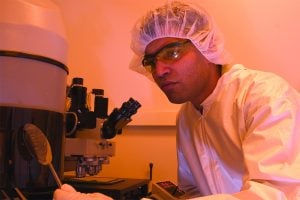
David Gracias, a professor of chemical and biomolecular engineering, has been selected for membership in the National Academy of Inventors, the highest professional distinction awarded solely to inventors. 170 distinguished academic inventors were named NAI fellows this year. The 2024 class represents 135 research universities, governmental, and nonprofit research institutions worldwide. Collectively, they hold more than 5,000 issued U.S. patents.
Zhaoli Sun, professor of surgery, pharmacology, and molecular sciences and director of the Transplant Biology Research Center at Johns Hopkins University School of Medicine, was also named as a 2024 fellow.
“This year’s class of NAI Fellows represents a truly impressive caliber of inventors,” said Paul Sanberg, president of the NAI, in a news release announcing this year’s cohort. “Each of these individuals is tackling real-world issues and creating solutions that propel us into the future. Through their work, they are making significant contributions to science, creating lasting societal impact, and growing the economy. NAI fellows as a whole are a driving force of innovation, generating crucial advancements across scientific disciplines and creating tangible impacts as they move their technologies from lab to marketplace.”
Gracias is an internationally renowned researcher in micro/nanotechnology, self-folding materials, and physical intelligence. He has secondary appointments in the departments of Chemistry and Materials Science and Engineering as well as the Laboratory for Computational Sensing and Robotics and the Institute for NanoBioTechnology. His secondary appointments at the Johns Hopkins School of Medicine are in the Department of Oncology, the Center for Microphysiological Systems, and the Sidney Kimmel Comprehensive Cancer Center.
His pioneering contributions are described in over 200 technical publications, including Science, PNAS, Nature-X, and Science-X. Gracias Lab’s research contributions have been highlighted by government agencies such as the NIH, NSF, and the U.S. Army and in the press, including The New York Times, Popular Mechanics, Discovery Channel, Forbes, and Scientific American.
A prolific inventor, Gracias holds 36 issued patents, with notable inventions on microchip backend integration, self-assembly, self-folding polyhedra, curved, folded, and integrated biosensors, microphysiological systems, thermoresponsive and DNA programmable soft-robots, untethered microgrippers and microinjectors. Several of these patents have been put into commercial practice, and his engineering translational efforts include co-founding a start-up that was later acquired.
Since its founding in 2012, the NAI Fellows program has grown to include 2,068 exceptional researchers and innovators, who hold over 68,000 U.S. patents and 20,000 licensed technologies. NAI Fellows are known for the societal and economic impact of their inventions, contributing to major advancements in science and consumer technologies. Their innovations have generated over $3.2 trillion in revenue and generated 1.2 million jobs. The 2024 class of fellows will be honored and inducted at the NAI 14th annual meeting on June 26 in Atlanta, Georgia.